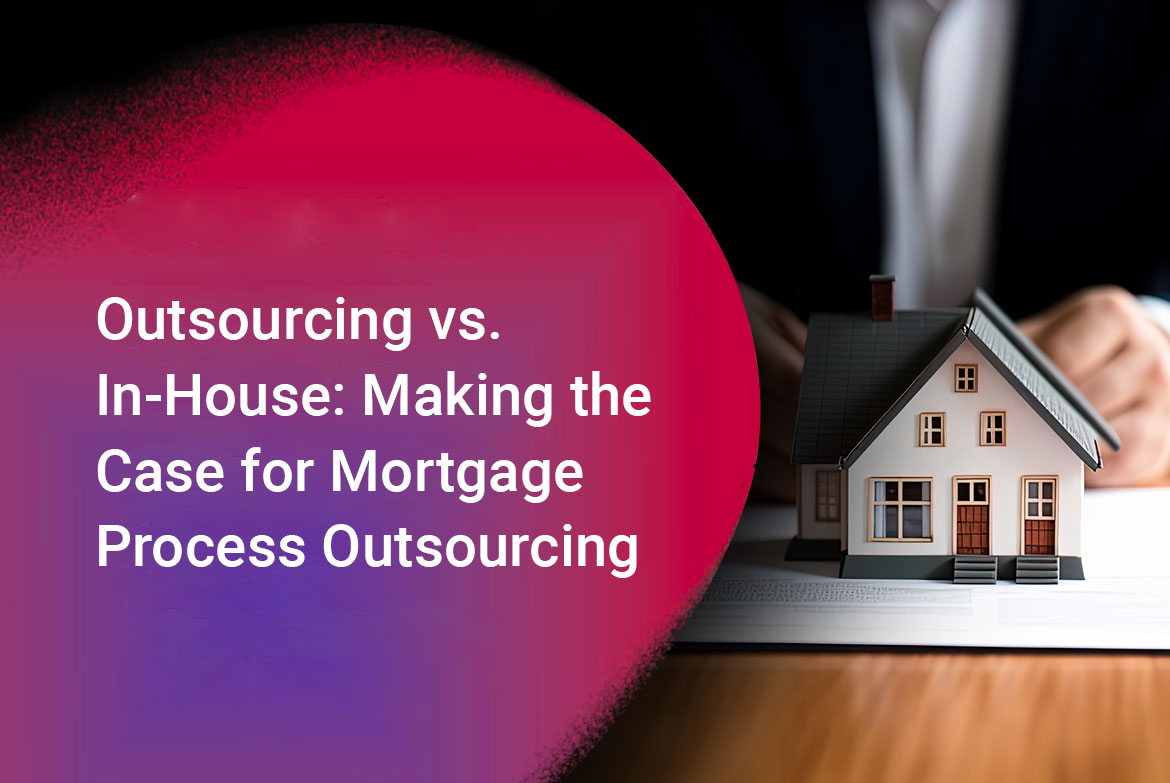In the ever-evolving landscape of the American mortgage industry, a transformative force is reshaping how lenders and credit unions operate – Mortgage Process Outsourcing. With offshore companies delivering remarkable advantages to the mortgage market, from cost savings to improved efficiency, the appeal of outsourcing has grown exponentially.
Discover how this paradigm shift is revolutionizing the way mortgage operations are conducted and how your business can thrive in this new era of streamlined processes and accelerated revenue generation.
Why Traditional In-House Staffing Is Transforming to Outsourced Mortgage Processing?
In response to an uncertain geopolitical climate, the Federal Reserve took action by raising the key interest rate 10 times from February 2022 to May 2023 to combat inflation. These moves were prompted by the pent-up demand caused by the COVID-19 pandemic and supply chain disruptions following the Ukraine-Russia conflict.
As a result, the mortgage market experienced a cooling effect, leading to a significant decline in new-mortgage applications. The MBA predicts a 19% decrease in total mortgage origination from USD 2.2 trillion in 2022 to USD 1.8 trillion in 2023. Purchase originations are expected to decrease by 12% to USD 1.38 trillion, and refinance volume is anticipated to drop by 35% to USD 428 billion in 2023.
The rising cost of maintaining an in-house team, coupled with the growing complexities of mortgage processing as well as stricter regulations, has prompted lenders to seek a more efficient and cost-effective solution: mortgage process outsourcing.
While in-house teams have been the conventional choice for mortgage lenders, recent trends indicate that mortgage process outsourcing is gaining momentum for several compelling reasons.
Here’s why!
- Cost Challenges: To save big on expenses by outsourcing mortgage processing, avoiding the rising costs of maintaining separate teams for separate jobs.
- Operational Inefficiencies: To streamline the mortgage loan servicing process flow with specialized resources and avoid delays and errors.
- Talent Shortage: To overcome the shortage of qualified underwriters and loan processors by leveraging industry experts from outsourcing partners.
- Changing Industry Landscape: To stay ahead of market backlash by relying on workforce flexibility that adapts swiftly to evolving regulations and market trends. Most outsourcing partners offer 24/7 assistance as opposed to in-house teams.
Let’s delve deeper!
Outsourcing vs In-House: Does Mortgage Process Outsourcing Actually Win?
In the fiercely competitive mortgage industry, the challenges of talent deficit, time-consuming processes, and the tedious nature of mortgage processing tasks have pushed lenders to explore better alternatives. And this is where mortgage process outsourcing emerges as a clear winner:
- Talent Deficit and Expertise: In-house teams often struggle to find and retain qualified underwriters and loan processors, leading to talent shortages. In contrast, mortgage process outsourcing providers boast a diverse talent pool of seasoned professionals with specialized knowledge in mortgage processing. This access to expertise ensures a higher level of accuracy and compliance in loan processing.
- Time Efficiency: The mortgage loan servicing process flow involves numerous time-consuming tasks, from document gathering to underwriting. In-house processing can be resource-intensive, resulting in delays and inefficiencies. On the other hand, outsourced teams leverage advanced technology, automation, and streamlined workflows that are expensive to maintain in-house, that also significantly reduces processing time and accelerates loan approvals.
- Flexibility and Scalability: Outsourcing offers flexible work models tailored to a lender’s specific needs. Outsourced teams can quickly scale up or down to handle fluctuating loan volumes during peak and lean periods. This agility ensures efficient handling of loan requests without compromising service quality.
Advantages of Outsourcing Vs. In-House: Mortgage Loan Processing Services
Modernization and industry trends indicate that mortgage process outsourcing offers a viable solution to overcome talent shortages, improve operational efficiency, and deliver enhanced customer experiences. Here’s how!
- Cost-Effectiveness: Outsourcing reduces costs by over 40%, eliminating the need for extensive in-house teams and saving on employee benefits and infrastructure expenses. Lenders can focus on core business goals with strategic resource allocation.
- Advanced Technology: Outsourced providers invest in cutting-edge business systems and analytics for optimized loan processing, accurate data, and compliance. This boosts efficiency and enhances borrower experiences.
- Compliance and Risk Management: Dedicated to expedited mortgage processing, outsourced teams keep up with changing regulations, minimizing compliance risks for lenders and reducing chances of financial penalties by 100%.
- Enhanced Customer Experience: Faster loan approvals and seamless interactions with borrowers through efficient processes and automation lead to higher customer satisfaction and loyalty.
Why In-House Teams for Mortgage Processing Don’t Make Sense Anymore
The mortgage sector relies heavily on GDP growth. Despite a slight upward revision, 1Q23 GDP growth was the weakest since 2Q22. Residential investment has softened due to high interest rates. Additionally, commercial and industrial lending by banks has slowed following the US banking crisis. The expected rise in the US unemployment rate to 4.0% in 2023 from 3.7% in May 2023 adds to the challenges of making mortgage operations leaner and more cost-effective.
On-premise teams just don’t cut it like before! Here are 3 reasons why.
- They’re Expensive: Maintaining in-house mortgage processing teams can lead to higher operational expenses, including salaries, training, and technology investments.
- Limited Expertise: In-house teams may not possess the same level of specialized expertise as outsourced providers, potentially resulting in slower loan processing and potential errors.
- Limited Scalability: In-house teams may face challenges in handling sudden fluctuations in loan volumes during peak periods, leading to potential bottlenecks and longer processing times.
10 Factors to Consider When Outsourcing Mortgage Processing to Service Providers
It is essential for mortgage lenders to carefully consider their unique business requirements and weigh the advantages and disadvantages of both in-house and mortgage process outsourcing models to make up their mind. But, if you are seeking an outsourcing partner, here are 10 factors you may want to weigh up before you make your decision.
- Expertise and Experience: Look for a provider with a proven track record in mortgage processing services. Experience ensures efficiency and accuracy in handling complex loan requirements.
- Technology and Innovation: Assess the provider’s technological capabilities, such as mortgage software solutions and automation, to streamline workflows and enhance loan processing speed.
- Compliance and Security: Ensure the provider adheres to industry regulations and maintains robust data security measures to protect sensitive borrower information.
- Scalability: Choose a partner that can scale their services based on your business needs, accommodating fluctuations in loan volumes effectively.
- Cost-Effectiveness: Evaluate the cost structure of outsourcing and compare it with in-house expenses to ensure you achieve cost savings without compromising quality.
- Customer Experience: Choose a provider that prioritizes borrower satisfaction, delivering seamless interactions and timely loan approvals to enhance customer experiences.
- Communication and Transparency: Seek a partner that maintains open communication channels and offers transparent reporting, ensuring you have real-time visibility into loan processing.
- Flexibility and Customization: Look for a provider willing to tailor their services to your specific business requirements, ensuring a customized and flexible approach.
- Integration and Collaboration: Ensure the outsourced provider can seamlessly integrate with your existing systems and work collaboratively with your in-house team.
- References and Reviews: Check client testimonials and reviews to gauge the provider’s reputation and reliability in the industry.
By carefully considering these factors, mortgage providers can forge a strong partnership with a partner offering mortgage processing solutions that align with their business goals, ultimately fostering enriched business relationships and driving success in the competitive mortgage market.
To know firsthand about outsourcing mortgage processing to experts who easily serve as an extension of your existing team, consult Expert Mortgage Assistance and Get a custom quote now!




